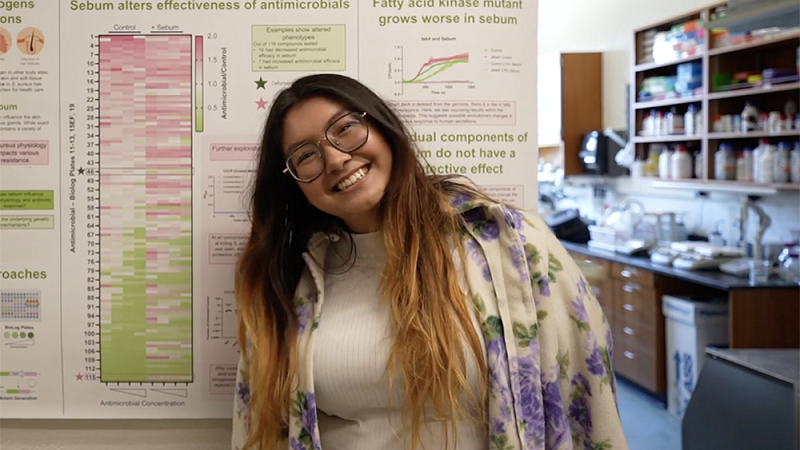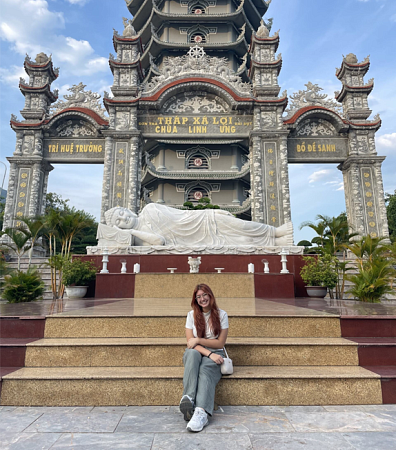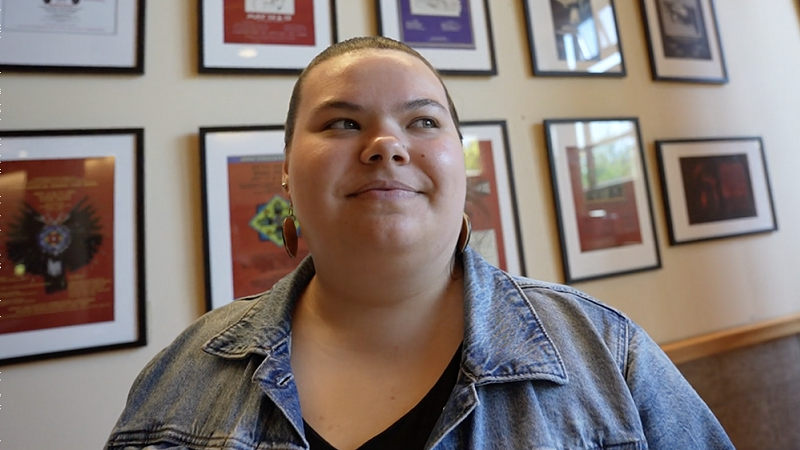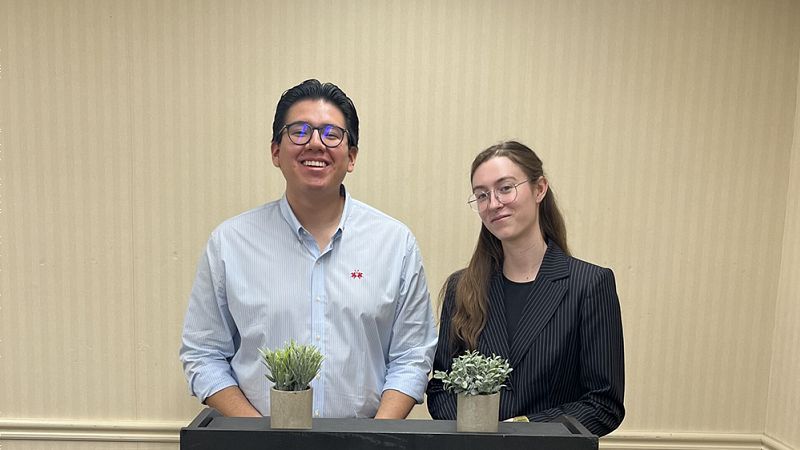
Experiential Learning | Research & Innovation | Community Impact | Career Preparation | Teaching Excellence | 21st Century Liberal Arts | Building Community | Good Vibes | CAS Spotlights | All Stories | Past Issues
Ready to Take on the World
BY GRACE CONNOLLY
JUNE 9, 2025
Intellectual curiosity is what drives a modern-day liberal arts education experience in the University of Oregon College of Arts and Sciences.
For some students, this might mean exploring how science has evolved over decades to become more inclusive and impactful. For others, it means bringing home knowledge that can improve your community. Or discovering how the Western literature canon can shed light on current issues, like the migrant experience.
The graduating class of 2025 represents the diversity of thought that is a hallmark of a liberal arts education. With 2,936 students graduating with a degree—including bachelor’s, master’s and PhD levels—this year’s group of CAS graduates is about 13% larger than last year’s.
Here’s a look at how some of our graduating seniors made the most of their time in CAS.

Working toward a more ethical science
As Dante' James wraps up her time as a Clark Honors College student and multidisciplinary sciences major, she looks back on the experiential learning opportunities that broadened her studies and taught her what it means to be an ethical researcher.
“The way scientists approach science is often, ‘Here's my experiment, here’s the outcome,’ and it’s not focused on the people and who are being affected,” she says. “I want to be able to know what my science is going towards.”
James, who minored in global health, studied the skin microbiome in the Barber Lab at the Knight Campus under the mentorship of postdoctoral researcher Caitlin Kowalski. But her experiential learning also took her out of the lab when she went to Vietnam to study diseases—and to meet some of her extended family on her mother’s side.
James’ interest in global health, specifically Vietnam, began when she took a course on malaria as a first-year student.

“Malaria is endemic to Vietnam and the Southeast Asia regions, so I wanted to expand on that more,” she says. “Growing up in a multicultural household and having friends from different cultures really inspired me. There are a lot of different issues regarding global health.”
While studying hand, foot and mouth disease in Vietnam, James, who is Vietnamese American, experienced the impact of disease firsthand during a family visit to a rural area of the country, where she contracted dengue fever. She saw the viral disease, which is transmitted by mosquitoes, as a learning opportunity to conduct research with a people-centered approach.
Her focus on global health research isn’t stopping at UO. After graduating in June, James will head to the University of Wisconsin, Madison, to pursue a PhD in microbiology. She hopes to combine research with various global health aspects to address issues across the world.
As she finishes her time at UO, James advises incoming students to take advantage of the many opportunities on campus. Meeting people from various backgrounds and building a network of friends and memorable moments is what college is for, she says, whether that’s playing on an intramural volleyball team, attending late night acapella shows or doing pizza crawls (she recommends Mezza Luna in downtown Eugene).
“Overall, my favorite memories are centered on the people that I met during my time here at UO, and are all very valuable to me,” James says.

Returning home to give back to the community
Kaitlynn Spino, a fifth-year senior studying marine biology and Native American and Indigenous studies, grew up in Klickitat, Washington, near the Klickitat River. Throughout her childhood, her Indigenous identity and connection with the river were important to her—and she brought both passions to the UO.
As an undergrad, Spino had many opportunities to explore her ancestral heritage from the Yakama Nation. One of these was practicing language revitalization with the Ichishkíin language, her tribal language. Through her revitalization classes, she’s translated and transcribed Ichishkíin, which she shares with communities outside of UO.
“Every project we do in the classroom goes back to the Yakama Nation Language Program, which is based in Toppenish, Washington. We’re able to put these resources and materials out for the community to learn, not just for babies, toddlers and kids but also adults who want to learn the language,” Spino says. “All of the projects I've been able to do have had a real impact.”
The Many Nations Longhouse has been a home for Spino as a student. Starting from her time as a freshman in the Native American and Indigenous Academic Residential Community, she’s since spent much of her time at UO studying, taking classes or participating in community culture nights at the Many Nations Longhouse.
“I was able to immediately connect with the Native community on campus, including my peers, who are also in the community with me,” Spino says. “It’s a place that feels like home away from home, and that’s really helped me get through college.”
Spino also participated in an exchange program that took her to another UO: the University of Otago in Dunedin, New Zealand. During the program, she met and connected with Indigenous students in New Zealand.
“I was able to go beyond the realm of just learning about Native American studies in what we now call the US, but into the international realm and across the world,” Spino says. “I was able to make international Indigenous connections.”
After she graduates in June, Spino plans to return to her home in the Columbia River Gorge to work with the tribal government in the fisheries department. She hopes to work on salmon restoration and maintaining salmon populations, allowing her community and many others to continue their ways of life.
“My family’s tribe, as well as the Columbia River plateau tribes, commonly refer to themselves as the salmon people. When your identity is wrapped up with such a species, when you lose it, you lose a part of your identity,” Spino says. “That’s my biggest goal for combining the two majors together, and being around the river growing up really shaped the majors I chose.”
As she prepares to graduate, Spino reflects on what she wishes she’d known entering her freshman year: It’s important to give yourself grace.
“It’s nerve wracking, and it’s your first experience with the real world,” she says. “Life’s going to throw some curve balls at you, and whatever happens, happens. You have to be kind to yourself. One bad grade isn’t going to determine your college career. That’s advice for myself—for little Kaitlynn. Don’t be hard on yourself. Be kind.”

Making the most out of college
When Tomas Peña was growing up in Santa Cruz de la Sierra, Bolivia, he loved to read and write, but he also jumped at any opportunity to solve puzzles. That’s what inspired him to double major in English and mathematics.
During his time at UO, Peña has become president of the UO’s chapter of the International English Honor Society. His role allowed him to travel to St. Louis and Pennsylvania to present at the organization’s annual national convention.
The first paper he presented, which had to be reviewed and submitted before his presentation, explored a text that Peña has a close connection with: Salmon Rushdie’s short story, “Good Advice is Rarer than Rubies,” from his East, West anthology of stories.
Rushdie’s story is about a woman in Lahore, Pakistan, who is trying to emigrate to England to be with her fiancé.
“Being an immigrant myself, this story definitely gave me a different perspective on the act of leaving your homeland, and it’s one of the papers that have definitely challenged me to become a better writer,” Peña says.
Peña’s time at the UO wasn’t just focused on academics. He started with the UO Brazilian Jiu-Jitsu club sport, and then a friend recommended he join the rowing club team. He spent more than a year training to join the team in winter 2024, and the work was worth it in the end.
—Tomas Peña, English and mathematics major
After graduating in June, Peña will stay at UO to wrap up his master’s degree in mathematics next year as part of the department’s accelerated master's program, which allows students to finish a master’s degree one year after graduation.
Peña then plans to apply for consultant jobs that will allow him to use his mathematics degree. In the long term, he plans to apply for a PhD program in literature with the goal of working to support authors in the publishing process.
“I would get to help writers get their stories shared with the world, and in the meantime, I would also know what it takes to get a story published,” he says.
As Peña reflects on his time at UO, he advises incoming students to put themselves out there in any way possible. Whether that’s meeting new people, trying new foods or joining new clubs, he says students should set clear goals for what they want their college experience to look like.
“Do a sport you have never even heard of. Partake in classes or conversations that you’ve never even considered before. Engage in conversations with people you don’t understand or agree with,” Peña says. “Check on others and check on yourself. Enjoy your time and just make the most of it.”
